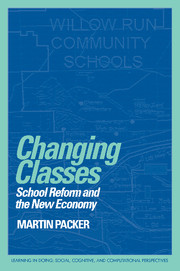Book contents
- Frontmatter
- Contents
- Series Foreword
- Acknowledgments
- Changing Classes
- Introduction
- 1 The Class of 2001: June 9, 1994
- 2 Blue Monday: December 1991–February 1992
- 3 Vehicles of Reform, Drivers of Change: March 1992–June 1993
- 4 America's Birthday: Summer 1993
- 5 The Last First Day? August–November 1993
- 6 Willow Run Is America: The 1940s and 1950s
- 7 Crossing to the New Economy: November 1993–April 1994
- 8 End-of-Year Report Cards: May–June 1994
- 9 Rest and Relaxation? Summer 1994
- 10 Caught in the Middle: August–November 1994
- 11 The Change Game: November 1994–June 1995
- 12 The Future of the Kids Coming Behind Us: June 1995–February 1997
- 13 Quality or Equality? The Standardization of Schooling: March 1997
- 14 Coda–June 1999
- Notes
- Index
3 - Vehicles of Reform, Drivers of Change: March 1992–June 1993
Published online by Cambridge University Press: 06 July 2010
- Frontmatter
- Contents
- Series Foreword
- Acknowledgments
- Changing Classes
- Introduction
- 1 The Class of 2001: June 9, 1994
- 2 Blue Monday: December 1991–February 1992
- 3 Vehicles of Reform, Drivers of Change: March 1992–June 1993
- 4 America's Birthday: Summer 1993
- 5 The Last First Day? August–November 1993
- 6 Willow Run Is America: The 1940s and 1950s
- 7 Crossing to the New Economy: November 1993–April 1994
- 8 End-of-Year Report Cards: May–June 1994
- 9 Rest and Relaxation? Summer 1994
- 10 Caught in the Middle: August–November 1994
- 11 The Change Game: November 1994–June 1995
- 12 The Future of the Kids Coming Behind Us: June 1995–February 1997
- 13 Quality or Equality? The Standardization of Schooling: March 1997
- 14 Coda–June 1999
- Notes
- Index
Summary
The 1983 document titled A Nation at Risk was the earliest of a series of reports blaming U.S. schools for the country's economic troubles. Famously, the authors of that report, commissioned by the secretary of education for President Reagan, T. H. Bell, fancied that “if an unfriendly foreign power had attempted to impose on America the mediocre educational performance that exists today, we might well have viewed it as an act of war.” They suggested that what amounted to “an act of unthinking, unilateral educational disarmament” has left the nation's schools lacking solid content to curriculum and with low expectations of student performance. Students spend less time in school than in other countries, and that time is used poorly. The profession of teaching pays badly, attracts less-qualified people than it might, and trains them insufficiently in the subject matter they will teach.
Citing “a steady 15-year decline in industrial productivity,” a situation in which “one great American industry after another falls to world competition,” A Nation at Risk declared that “the risk is not only that the Japanese make automobiles more efficiently than Americans and have government subsidies for development and export,” but more broadly that we are entering an information age, a global village, where the “new raw materials” are “knowledge, learning, information, and skilled intelligence.” To compete in world markets for industry and commerce, the nation's educational system needs reform.
- Type
- Chapter
- Information
- Changing ClassesSchool Reform and the New Economy, pp. 41 - 69Publisher: Cambridge University PressPrint publication year: 2000



